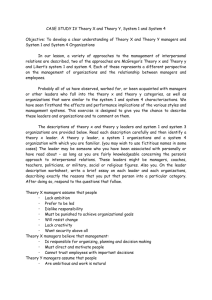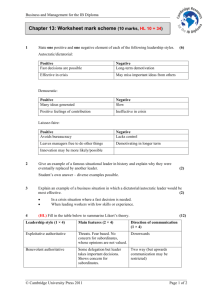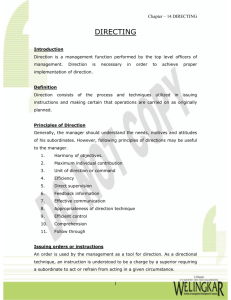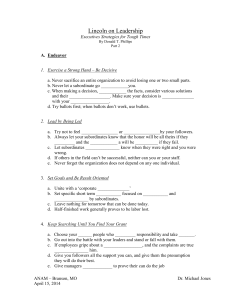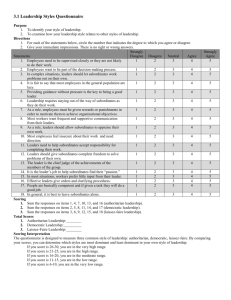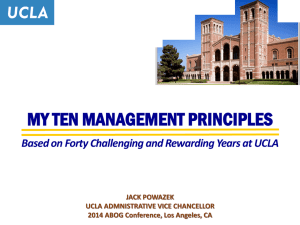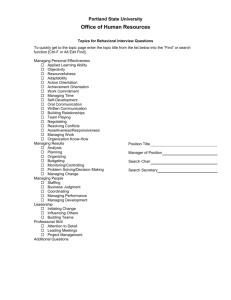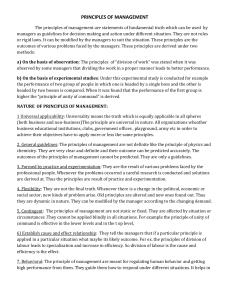Chapter 1
advertisement
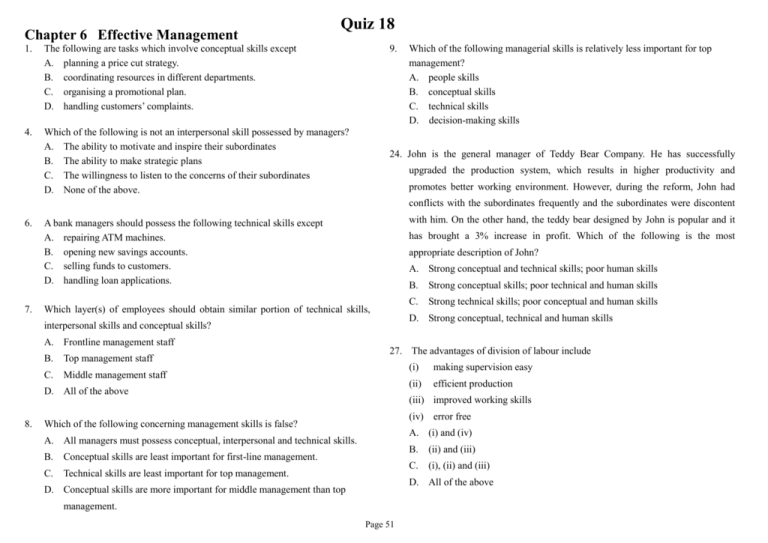
Chapter 6 Effective Management Quiz 18 1. The following are tasks which involve conceptual skills except A. planning a price cut strategy. B. coordinating resources in different departments. C. organising a promotional plan. D. handling customers’ complaints. 4. Which of the following is not an interpersonal skill possessed by managers? A. The ability to motivate and inspire their subordinates B. The ability to make strategic plans C. The willingness to listen to the concerns of their subordinates D. None of the above. 9. Which of the following managerial skills is relatively less important for top management? A. people skills B. conceptual skills C. technical skills D. decision-making skills 24. John is the general manager of Teddy Bear Company. He has successfully upgraded the production system, which results in higher productivity and promotes better working environment. However, during the reform, John had conflicts with the subordinates frequently and the subordinates were discontent 6. 7. with him. On the other hand, the teddy bear designed by John is popular and it A bank managers should possess the following technical skills except A. repairing ATM machines. B. opening new savings accounts. C. selling funds to customers. D. handling loan applications. has brought a 3% increase in profit. Which of the following is the most appropriate description of John? A. Strong conceptual and technical skills; poor human skills Which layer(s) of employees should obtain similar portion of technical skills, B. Top management staff C. Middle management staff C. Technical skills are least important for top management. (i) making supervision easy (ii) efficient production (iv) error free A. (i) and (iv) A. All managers must possess conceptual, interpersonal and technical skills. Conceptual skills are least important for first-line management. Strong technical skills; poor conceptual and human skills (iii) improved working skills Which of the following concerning management skills is false? B. C. 27. The advantages of division of labour include D. All of the above 8. Strong conceptual skills; poor technical and human skills D. Strong conceptual, technical and human skills interpersonal skills and conceptual skills? A. Frontline management staff B. B. (ii) and (iii) C. (i), (ii) and (iii) D. All of the above D. Conceptual skills are more important for middle management than top management. Page 51 32. Workers of garment factory are assigned to different departments such as cutting, sewing and ironing. Which of the following are the reasons for such practice in this factory? (1) Practice makes perfect. (2) Training time can be saved. (3) Employees get motivated by performing the same tasks repeatedly. A. (1) and (3) only B. (2) and (3) only C. (1) and (2) only D. (1), (2) and (3) 42. Which of the following is the reason for delegation? A. The ambitions of the subordinate. C. avoids conflicting instructions given by two or more superiors. 36. Which of the following are the possible outcomes after implementing unity of command? (1) Better communication between superiors and subordinates (2) Increased workload of staff (3) Better supervision over subordinates (4) Growing dependency of different production processes A. (2) and (4) only (1) and (3) only C. (1), (2) and (3) only The controlling tool of the organization. following factors: (1) the subordinate’s ability (2) the subordinate’s sense of responsibility (3) the subordinate’s gender (4) the subordinate’s age A. (3) and (4) D. All of the above B. C. 48. A manager who delegates authority to a subordinate should consider the A. ensures that all employees follow the same plan and have the same goals. avoids conflicting goals that may act against each other in an organisation. The appointment of the organization. D. The over-workload of the superior. 35. Unity of command B. B. B. (1) and (2) C. (1), (2) and (3) D. All of the above 51. Which of the following statements about delegation of authority and assignment of responsibility are correct? (1) Managers should promote the subordinates based on their work experience. (2) Managers should define the subordinates’ duties clearly to ensure that they understand the job requirements. (3) Subordinates will take the initiative to finish the job after they are delegated D. (1), (2), (3) and (4) with authority. The managers do not need to supervise them. (4) Managers should consider subordinates’ strengths when they delegate 39. Which of the following is not a characteristic of unity of direction? authority and assign responsibilities. A. A subordinate has only one superior. B. Each plan is led by only one manager. A. (1) and (3) only C. The manager has the authority to instruct and coordinate the action of other B. (2), (3) and (4) only people. C. (1), (2) and (4) only D. (1), (2), (3) and (4) D. The efforts of all the staff are directed towards achieving the same goals. Page 52 53. Which of the following is a disadvantage of MBO? 71. A CEO groups similar activities in his company under one plan and assigns one A. It focuses only on long-term objectives. manager to be responsible for monitoring its implementation. This is an B. It does not motivate subordinates to achieve their objectives. application of C. It does not provide clear objectives to subordinates. A. unity of command. D. It focuses only on short-term objectives. 60. Arrange the following steps of MBO in the correct sequence. (ii) setting objectives (iii) implementing the plan (iv) developing an action plan (ii) → (iv) →(i)→(iii) B. (i) → (ii) →(iii)→(iv) C. D. (ii) → (iv) →(iii)→(i) (i) → (ii) →(iv)→(iii) 66. Which of the following management principles has been violated when a worker has two superiors? A. Division of work B. Unity of direction C. Authority and responsibility D. Unity of command 69. A doctor assigns different jobs to his nurses, with each responsible for different sections: registration, consultation, cashier and medicine. This is an application of A. division of labour. B. unity of command. C. unity of direction. division of labour. C. unity of direction. D. MBO. (i) reviewing performance A. B. D. delegation. Page 53

